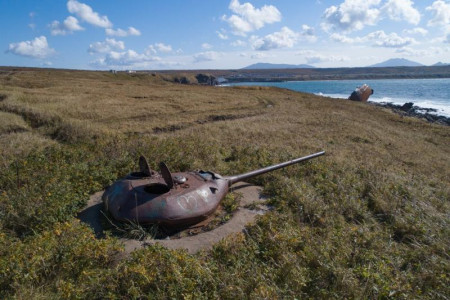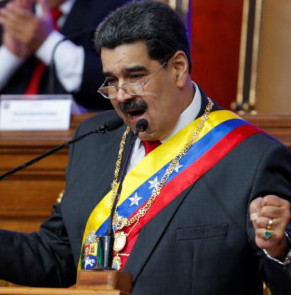
The only thing that has by and large interested Japan in its relations with Russia is the return of the four islands with the southern Kuriles archipelago they refer to as the “Northern Territories.” It has always been the case. And the June 5 meeting between Russian President Vladimir Putin with heads of international news agencies SPIEF sidelines was no exception here.
Executive director of Japan’s Kyodo News agency Toshimitsu Sawai formulated his question the following way:
“Today, the world’s Far East features lots of issues that provide causes for concern in Japan. First, it’s about territorial problems with Russia. Also, it’s Russia's currently deepening military cooperation with North Korea. These are the two challenges we have been facing in Japan.” The Japanese journalist wanted to know whether Mr. Putin had any specific plans to visit the islands — a thing he recently mentioned in Khabarovsk — or whether the trip of the kind would deal a severe blow to bilateral relations.
The formulations are true to form: after WWII, Tokyo outsourced its foreign and defense policy to the United States, keeping to exaggerate the essentially revanchist “island theme” alone — again, under Washington’s eagle eye, by the way. And since Japan’s position boiled down to the fact that Russia should unconditionally cede the islands to it, the topic grew to become a reliable brake on any healthy development of ties between the two, although they would need to strengthen those in every possible way, at least given their geographic proximity.
However, the response by the Russian president was anticipated: “Back in the 50s, both of us are well aware of this, the Soviet government made a decision — in my opinion, it was 1956; a declaration was signed stating that the Soviet Union was ready to transfer two of these islands to Japan. Still, it was not stipulated on what grounds or under whose sovereignty the islands should be after that, or other conditions, perhaps material, or something else. But the declaration did contain the transfer idea itself. Moreover, it was even ratified by the USSR’s Supreme Council. Then for some reason the Japanese side refused to fulfill those agreements, and the Soviet Union also took off ratification from the table.
“At the request of the Japanese side, we returned to consider the issues. The dialogue was not easy, but it did take place after all.
“You’ve just mentioned several problems, including my visit to the islands. The Russian Federation proceeds from the fact that they are part of its sovereign territory <…> Therefore, the first thing I want to say is that I see no reasons to abstain from visiting these islands, although, frankly speaking, I have no such plans at this point due to simple business with issues of a different nature.”
By saying so, Putin has returned the ball to the “unfriendly state’s” side: “Do you think that my hypothetical decision to visit the Kuril Islands is more harmful than the Japanese government’s desire to inflict a strategic defeat on the Russian Federation? I understand that this is not your personal question but the one dictated by your editors and so on. So, you better readdress it to your chiefs.”
The President emphasized that “we see Japan’s involvement in the Ukrainian crisis. At this point, the situation is not favorable for continuing the peace treaty dialogue between Russia and Japan. We do not rule out that it may be resumed, but only when proper conditions are created, first of all by the Japanese side.”
The “chiefs” who apparently tasked the journalist with asking Putin about his trip to the Kuriles have not been long in their response.
The Japanese government considers it “unfair and unacceptable” that Russian President Vladimir Putin deems the Russian-Japanese dialogue as only possible after Tokyo changes its stance on Ukraine. Japanese Chief Cabinet Secretary Yoshimasa Hayashi stated this on June 6 at a regular press conference.
“We believe that Russia is trying to shift responsibility on Japan, and this stance is unfair and totally unacceptable,” he responded to journalists’ request to comment upon the Russian leader’s statements. Hayashi once again criticized our country’s actions in Ukraine, reiterating that the Japanese government’s stance on “resolving the problem of Northern Territories and on signing a peace treaty with Russia remains unchanged.”
And the answer regarding the visit to the southern Kuriles has apparently calmed Tokyo for now. Putin has not yet visited the place, but Dmitry Medvedev’s trips there, including as president, were making Tokyo extremely anxious. The sentiment manifested itself in different ways, but once it somehow got to the point that Japanese Prime Minister Naoto Kan called Medvedev’s November 2010 arrival in Kunashir a brawl (for some reason, the Russian media then used the euphemism “inadmissible gruffness,” although the mentioned Japanese word is traditionally used to describe disorderly conduct by European soccer fans).
Despite all the reiterated “mantras” and “spells” about the need to conclude a peace treaty with Russia — for which read to get back the southern Kuril Islands, — Japanese politicians have never been able to do so over the entire post-war period. And the present-day climate puts an end to the political dialogue between Moscow and Tokyo.
After the latter imposed anti-Russian sanctions over Ukraine, Russia halted any consultations on a peace treaty and withdrew from negotiations on establishing joint economic activities in the southern Kuriles.
A visit by the Russian leader to the place will only emphasize the Kishida government’s utter inability to solve the “territorial issue” as it acquires particular significance amid Japan’s attempts to at least slightly expand the Washington-limited sovereignty. However, little may harm the incumbent Japanese Prime Minister, who has been teetering on the brink of resignation for a year now.
Meanwhile, preparations for the Russian president’s visit to the DPRK are in full swing, the Kremlin says, and it would be quite reasonable to combine it with a trip to the Kuril Islands. Also, the Japanese journalist’s question about relations between Moscow and Pyongyang would get an answer right away.









